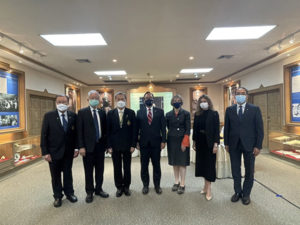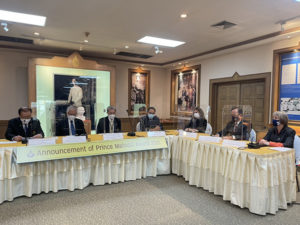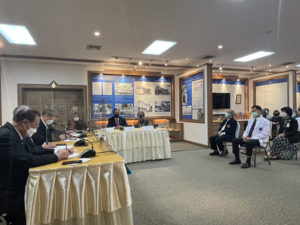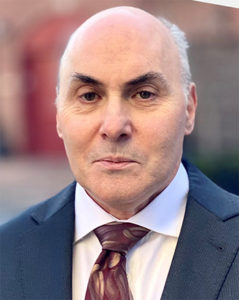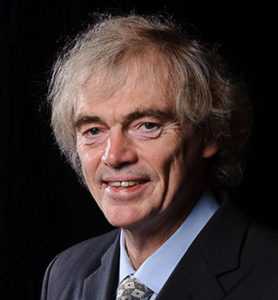On 15 November 2021, Professor Dr. Prasit Watanapa, M.D., Ph.D., Dean of the Faculty of Medicine, Siriraj Hospital, Mahidol University, in the capacity of Vice President of the Prince Mahidol Award Foundation, Mr. Tanee Sangrat, Director-General of the Department of Information, Ministry of Foreign Affairs of Thailand, in the capacity of the Chairman of the Sub-Committee on Public Relations of the Prince Mahidol Award Foundation, and Professor Vicharn Panich, Chairman of the International Award Committee of the Prince Mahidol Award Foundation, held a joint press conference to announce the 30th Prince Mahidol Award for 2021 at the Prince Mahidol Memorial Room, 2nd Floor, Syamindra Building, Siriraj Hospital.
This year, the Prince Mahidol Award in the field of Medicine is awarded to Associate Professor Katalin Karikó, Ph.D., Professor Drew Weissman, M.D., Ph.D., and Professor Pieter Cullis, Ph.D.
There were 86 nominations from 35 countries. The Scientific Advisory Committee carefully screened all candidates from the year 2019 – 2021 and subsequently submitted a short list of candidates to the International Award Committee who made a recommendation to the Board of Trustees. H.R.H. Princess Maha Chakri Sirindhorn presided over the meeting of the Board of Trustees held on 26 October 2021 during which the final decision on the Prince Mahidol Award 2021 was made.
In the past 29 years, the Prince Mahidol Award has been conferred to 87 individuals and groups of individuals and institutions. Among them, 4 were Award recipients of Thai nationality, namely: (1) Professor Dr. Prasong Tuchinda, from studying the effects of Dengue virus to the disability of children who are sick with dengue hemorrhagic fever, (2) Dr. Suchitra Nimmannitya, from identifying severity classification of dengue hemorrhagic fever. Both of them received the Prince Mahidol Award in the field of Medicine in 1996; (3) Dr. Wiwat Rojanapithayakorn, from founding the project to promote the use of condom to prevent spread of HIVs; and (4) Mr. Mechai Viravaidya, from initiating the comminucation campaign to disseminate the use of condoms. Both Dr. Wiwat Rojanapithayakorn and Mr. Mechai Viravaidya received the Prince Mahidol Award in the field of Public Health in 2009.
Among the Awardees of the Prince Mahidol Award, 5 subsequently received the Nobel Prize:
(1) Professor Barry J. Marshall from Australia was conferred the Prince Mahidol Award in the field of Public Health in 2001 for the discovery of the new bacterium identified as Helicobacter pylori that caused severe gastritis and its sensitivity to particular antibacterial drugs. He received the Nobel Prize in the field of Medicine in 2005 for the same discovery;
(2) Professor Harald Zur Hausen from Germany was conferred the Prince Mahidol Award in the field of Medicine in 2005 for the discovery of the human papilloma virus HPV16 and HPV18 from the cancer tissue and elucidated how the viruses turn normal cells into cancer cells. He received the Nobel Prize in the field of Medicine in 2008 for the same discovery;
(3) Professor Dr. Satoshi Omura was conferred the Prince Mahidol Award in the field of Medicine in 1997. He is known for the discovery and development of various pharmaceuticals originally occurring in microorganisms. His research group isolated a strain of Streptomyces Avermitilis that produce the anti-parasitical compound avermectin which contributed to the development of the drug ivermectin that is currently used against river blindness, lymphatic filariasis, and other parasitic infections. He received the Nobel Prize in the field of Medicine in 2015 for the same discovery;
(4) Professor Tu You You, a member of the China Cooperative Research Group on Qinghaosu and its Derivatives as Antimalarials, was conferred the Prince Mahidol Award in the field of Medicine in 2003 in an organisational category for the discovery of Qinghaosu as a new drug for treatment of the P.falciparum malaria. He received the Nobel Prize in the field of Medicine in 2015 for the same discovery;
(5) Sir Gregory Paul Winter was conferred the Prince Mahidol Award in the field of Medicine in 2016. He was a pioneer in the field of antibody engineering and modification technology. He invented techniques to humanise antibodies for therapeutic uses, which later led to the creation of cutting-edge therapeutic drugs. He received the Nobel Prize in the field of Chemistry in 2018 for the same discovery.
The Prince Mahidol Award Foundation under the Royal Patronage was established on 1 January 1992 in commemoration of the centenary of the birth of His Royal Highness Prince Mahidol of Songkla. The Foundation is under the Royal Patronage, with Her Royal Highness Princess Maha Chakri Sirindhorn as President.
The Foundation annually confers two Prince Mahidol Awards upon individual(s) or institution(s), who have demonstrated outstanding and exemplary contributions to the advancement of the world’s medical and public health services. Each Award consists of a medal, a certificate, and a prize to the sum of US $100,000.
Prince Mahidol Award Laureate 2021
in the Field of Medicine
Katalin Karikó, Ph.D.
Senior Vice President,
BioNTech RNA Pharmaceuticals, Germany
Adjunct Associate Professor,
Perelman School of Medicine,
University of Pennsylvania, Philadelphia, USA.
Hungary/USA
and
Drew Weissman, M.D., Ph.D.
Director of Vaccine Research,
Infectious Diseases Division
Professor, Department of Medicine,
Perelman School of Medicine,
University of Pennsylvania, Philadelphia, USA.
USA
Associate Professor Katalin Karikó received her Ph.D. from University of Szeged, Hungary.
Professor Drew Weissman received his M.D. and Ph.D. from Boston University, USA before attended the training program with Dr. Anthony Fauci, who received the Prince Mahidol Award in the field of medicine in 2013, at the National Institutes of Health, Maryland, USA.
Assoc. Prof. Karikó and Prof. Weissman have been working side by side in developing mRNA technology and its applications in medicine. In 2006, they discovered that modification of nucleosides in mRNA could reduce cellular reactions toward foreign RNA. This was an important step in the utilization of mRNA technology. Foreign RNA is naturally recognized by cellular anti-viral machinery, which suppresses translation of mRNA and induces inflammation. These reactions were the main obstacle preventing the applications of mRNA in prevention and treatment of diseases. This and subsequent studies of Assoc. Prof. Karikó and Prof. Weissman have led to the use of pseudouridine in mRNA production and invention of purification method for pseudouriine-containing mRNA. These are the critical basis for the mRNA vaccine development. Prof. Karikó and Prof. Weissman have also played important role in the rapid development of COVID-19 mRNA vaccine.
The achievement of Assoc. Prof. Dr. Karikó and Prof. Weissman has led to the rapid availability of COVID-19 mRNA vaccine, which has saved millions of lives and become an important tool for the control of COVID-19 pandemic around the world.
Pieter Cullis, Ph.D.
Professor, Department of Biochemistry & Molecular Biology,
University of British Columbia, Vancouver
Canada
Professor Pieter Cullis received his Ph.D. from the University of British Columbia and continued his research career there in lipid biochemistry.
Prof. Cullis is a pioneer in lipid nanoparticles, which have been used for various applications in medicine such as delivering anticancer drugs to cancer tissues without causing too much toxicity in normal tissues. The most remarkable type of lipid nanoparticles developed by Prof. Cullis is lipid nanoparticles with ionizable cationic lipid. These lipid nanoparticles have no charge at neutral pH, but become positively charged in low pH. Because of the absence of positive charge, the lipid nanoparticles are not toxic to cells. When they are taken up by cells into endosomes, the acidic pH in endosome turns the neutral lipid into positively charged lipid, which causes fusion to negatively charged cellular membrane. This membrane fusion delivers the content of the lipid nanoparticles into cytoplasm of the cells. This technique has been successfully employed to develop the delivery system of mRNA vaccines, which are being used to control the COVID-19 pandemic.
The achievement of Prof. Cullis not only made COVID-19 mRNA vaccines possible but has also created a way to safely deliver nucleic acid into cells, which opened up possibilities for various applications of nucleic acid technology for prevention and treatment of many diseases in the future.

